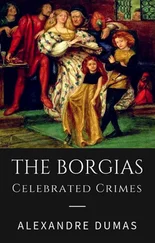And during Carnival at the beginning of 1508, it was noted, with relief, that Lucrezia was finally heeding the advice of her doctors, and the urgent entreaties of her husband, and was avoiding the excesses in which she had indulged in previous years, even to the extent of forgoing her pleasure in dancing. There was, however, plenty for her to enjoy: watching the jousts and the other displays of horsemanship; enjoying the daring feats of the tightrope walkers and acrobats; laughing at the ribald comedies performed in the theatre; and listening to the new songs she had commissioned specially for Carnival, which were performed, along with some of her old favourites, by the court musicians.
On April 3 Duke Alfonso had to leave his heavily pregnant wife for a few days to go to Venice on urgent business, no doubt optimistic that this pregnancy would end more satisfactorily than its predecessors. So he was absent when, the next day, Lucrezia gave birth to a boy, which, all who saw the baby agreed, appeared to be perfectly healthy; and he was named Ercole after his paternal grandfather.
The birth of an heir was greeted with great excitement and joy in Ferrara; the church bells rang out across the city; guns were fired; fireworks lit the skies. In their enthusiasm for celebrations, according to a local chronicler, the populace made bonfires of
all the screens in the market place and elsewhere and all the benches of the notaries and the table of the judges from the Palazzo della Ragione, as well as all its windows and doors, and they also burnt the ladies’ pews from the cathedral and the other large churches, and all the benches, tables, stools and doors in the public schools at San Domenico and San Francesco, and the celebrations went on for three nights.
Ercole was christened in the chapel of the ducal palace soon after his birth. ‘He was not baptized in public,’ reported the chronicler, ‘and it is not known who held him at the font,’ though he did know the identity of the wet nurse employed to feed him, who was the daughter of a carpenter in the city. Nor is there any evidence that the apparently hasty and private christening betokened any infirmity on the part of the baby. Indeed, once Duke Alfonso returned from Venice a few days later, he proudly displayed his little heir to the ambassadors and other dignitaries, who were asked to examine little Ercole lying naked on his back, less handsome than he had first been reported but evidently ‘complete.’
Alfonso announced the birth of his heir in jubilant letters dispatched to courts throughout Italy and beyond. The duke had informed his brother-in-law Francesco Gonzaga in a letter sent before he left Venice, and the marquis returned this gesture of friendship by sending his own secretary to Ferrara to offer congratulations on his behalf. Lucrezia, following the conventions of the period, sent her news to Isabella d’Este. Aware that the friendship between his wife and his brother-in-law was causing food for gossips at court, Alfonso was determined that Lucrezia should behave in the usual formal manner and forbade her to communicate the news to the marquis; Lucrezia had been furious and made it quite plain that she was so. Could it be, the question was inevitably asked, that the baby was not the child of Alfonso d’Este, Duke of Ferrara, but of Francesco Gonzaga, Marquis of Mantua, a man whom Alfonso much disliked? Certainly the baby’s nose looked rather squashed as does Francesco Gonzaga’s in Mantegna’s Madonna della Vittoria . Certainly, also, Lucrezia, now that her baby was born, continued to urge Gonzaga to come to Ferrara to see her.
When Isabella’s informant Bernardino di Prosperi saw the baby, he also pronounced the heir to be handsome and lively. He was also full of praise for the cradle that Lucrezia had commissioned, a classically inspired structure, all gilded, with coverlets of cloth-of-gold and fine cambric sheets, which had been beautifully embroidered: ‘of such splendour,’ he thought, ‘that I do not have words to describe it.’
On April 12, just over a week after Ercole’s birth, Duke Alfonso departed once again on business, this time to France, leaving Lucrezia alone once more and hopeful that Francesco Gonzaga would pay her a visit. ‘You would be more dear to her than 25,000 ducats and more, if you were to come,’ Ercole Strozzi assured the marquis. Every day, he said, we talk of you. ‘I cannot describe the passion which has overwhelmed her,’ he wrote; ‘she is most anxious to hear why you have not answered her letters.’
No reply came to this letter. It may well have been that Francesco Gonzaga was concerned by what might happen to him if he were to go to Ferrara to see Lucrezia. He had recently been troubled by a man purporting to represent her who had arrived at Mantua with the suggestion that he might go to Ferrara to see her in secret. Gonzaga suspected a trap and paid no attention to this suggestion, whereupon the man offered him a miniature of Lucrezia that Gonzaga declined.
Meanwhile, still no word for Lucrezia came from Mantua. Strozzi’s letters on her behalf became almost desperate. ‘She loves you passionately, much more than you can imagine. If you knew this you would be much more ardent in your letters and much more anxious to come to see her wherever she was. Do at least give her some sign of loving her. She asks for nothing more… Do make every effort to come to her. In any case write to her and don’t appear so cold.’
Still Francesco Gonzaga did not respond; and it seemed that his caution was well justified. On June 5 Lucrezia had written to him with the news that the Spanish priest who had helped Cesare escape from prison and who had joined her household in Ferrara had been found ‘treacherously murdered’; that very night Ercole Strozzi also was killed. The chronicler Giovanni Maria Zerbinati reported the death of this ‘most distinguished poet,’ who, he said, ‘was found dead outside the church of San Francesco, in the middle of the street by the picture of the Virgin that is on the pilaster attached to the wall of the church’; the body was found to have received ‘twenty-two stab wounds and his throat was cut and no one knows who killed him,’ though many in Ferrara and Mantua had their suspicions that Cardinal Ippolito, or even Duke Alfonso, had a hand in the crime.
Lucrezia now had to find a new messenger for her letters to Gonzaga; and she found one in Ercole Strozzi’s brother. ‘Lorenzo Strozzi is coming to Mantua,’ she wrote to Gonzaga. ‘He is as devoted a servant as was Ercole, his brother.’
But Gonzaga had no intention of going to see Lucrezia. He wrote to say that he was ill, too ill to travel. She pleaded with him; he was still too ill. In that case, she said, she would come to look after him; and she was on the point of joining him when her husband and Cardinal Ippolito heard of her intentions and took her back to Ferrara.
As had been the case with Pietro Bembo, their ardour cooled to affection and the two remained on friendly terms, corresponding regularly for the rest of their lives. Meanwhile, Lucrezia mournfully resumed her life in Ferrara, once again the dutiful wife and consort, and now, with age, less the happy, lively, young woman she had once been, who had rejoiced in wearing those extravagant hats she had designed for herself and her ladies to attend Mass in the cathedral.
On April 26, 1509, news arrived in Ferrara that Duke Alfonso had been given the post of captain-general of the church by Julius II, much to the fury of his brother-in-law Francesco Gonzaga, but to the joy of his subjects, who greeted the announcement with the customary peals of bells, thunder of artillery, and flashing fireworks. This appointment was particularly important in the light of the fact that the pope had recently arranged an alliance to curb the growing power of Venice, declaring that he would join forces with anyone in order to reduce the city once more ‘to a little fishing village’ — and, indeed, he had been joined by most of the ruling heads of Europe: Emperor Maximilian, Louis XII of France, Ferdinand of Spain, and most of the Italian powers, including both Mantua and Ferrara.
Читать дальше











